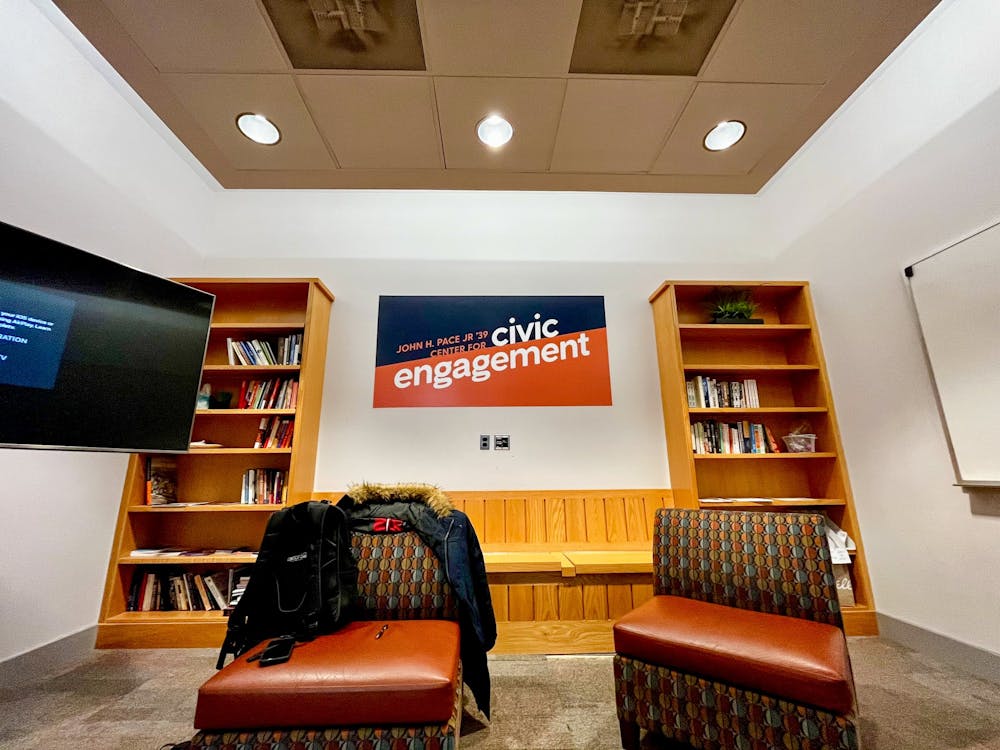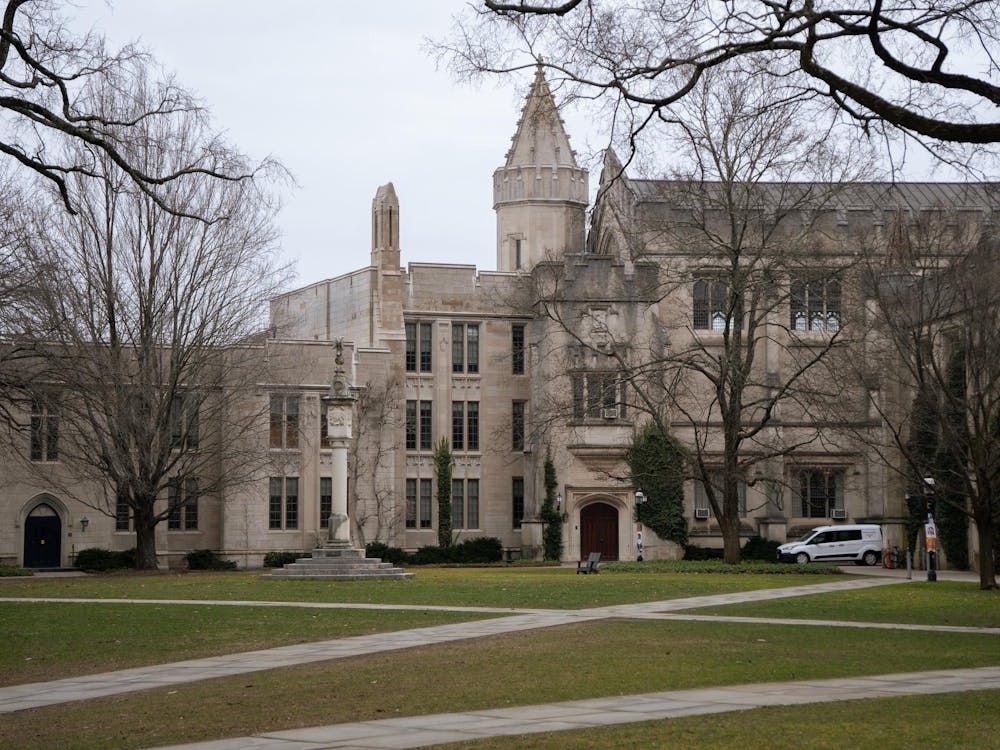The following is a guest contribution and reflects the author’s views alone. For information on how to submit to the Opinion Section, click here.
Content Warning: The following article includes mention of student death. University Counseling services are available at 609-258-3141, and the Suicide Prevention Lifeline is available 24/7 at +1 (800) 273-TALK (8255). A Crisis Text Line is also available in the United States; text HOME to 741741. Students can contact residential college staff and the Office of Religious Life for other support and resources.
I entered the Spelman Hall dorm of my new Atmospheric Chemistry partner, Phoebe, and saw a familiar face that I had not expected to see: Abraham Joshua ’21. Abe was my Outdoor Action leader from first-year orientation. He had just returned from a gap year, and as it turned out, was Phoebe’s roommate. What I thought was just a chance encounter was in fact facilitated by Abe — upon learning I was in the class with Phoebe, his best friend, he encouraged her to get to know me and told her to invite me to their place. He thought we would be good friends. That night, as I worked on the problem set with Phoebe, I caught up with my OA leader. Abe stopped by many times as Phoebe and I studied that semester, and we became very good friends. He was wise beyond his years; when I first met him, he was just my OA leader, but as I spent more time getting to know him I realized how much he was looking out for me, even long after first-year orientation. Abe graduated later that semester and moved to San Francisco to work for Teach for America.
One year later I was up late studying for a midterm scheduled for 10 a.m. the next morning when I saw a message in my OA trip group chat: “Abe passed away this morning.” He had been hit by a vehicle on his way to the elementary school where he worked.
In my time at Princeton, four current students have passed away — there has been a student death and a death of a staff member this semester. There have also been losses in our broader community, including Abe. There is so much more that Princeton can do to prevent mental health-related deaths of current community members, and we need to have that conversation. We also need to talk about the impact on those who have to process the grief of someone close to them passing away. Princeton does nowhere near enough to help the students and community members affected. As I learned in the days following Abe’s death, recovering from such a loss is a long and difficult process and can’t be solved by Princeton’s perfunctory acknowledgements.
When I first heard about Abe’s death, I didn’t know how to process the information. I tried to keep studying for my midterm, until 10 minutes later, when his passing had sunk in and I broke down crying. I spent the remainder of that evening in the dorm room of my other OA leader reflecting on our experiences with Abe.
I had texted Phoebe, Abe’s roommate and now my good friend, on my way to my other OA leader’s dorm to ask if she was okay and if she wanted to talk, and as I headed home later that night, I finally got her response: “Yeah, why?” I realized that she was unaware of Abe’s passing. Having to tell Phoebe that her best friend, someone who she had planned to travel the world with, was no longer with us was the most difficult conversation I’ve ever had to have.
I trudged back to my dorm, to sit in my bed and stare at the ceiling until I couldn’t anymore and then pass out. Abe was my first mentor at this school, the first person to tell me that it’s okay to not be perfect at Princeton, and someone whom I deeply respected. He was an important part of my early Princeton experience, and now he was gone. My midterm, meanwhile, was a mere six hours away. I felt there was no way for me to get the midterm moved on such short notice, and so, the next morning, I woke up, took the test, then stumbled back to my room to cry some more.
My residential college had finally sent out an email acknowledging Abe’s passing earlier that day, offering assistance to anyone who needed to talk or receive academic accommodations as they dealt with grief. I decided to walk to my college office to get some help. There was no one in the office when I arrived, and I was informed that my Dean and Director of Student Life were likely unavailable for the indeterminate future as it was the Thursday of midterms week. I was told my best option was to wait around and hope I could catch them in person to request a brief in-person meeting, but I decided to leave. I didn’t want to grieve in public.
I returned to my room dejected. There was nothing to do but gather up the courage to personally email my professors and ask for extensions on the papers, proposals, and midterms that remained. Having to outline the grief that I was processing to each of my professors so that I could receive basic accommodations was embarrassing and difficult to say the least, but I didn’t have any other options.
My professors were generally accommodating (although one agreed to grant an extension for only 24 hours), and my closest friends were willing to help me with whatever I needed those next few days. Yet I found myself spending those days telling myself that the grief that I was experiencing wasn’t even genuine, or questioning whether I was just using the situation to my advantage for midterms. I was completely dissociating from the world around me, but I still had midterms to complete and a spring break trip to go on, so I tried my best to just get over it and, for the rest of the semester, to go on as usual.
As my senior year started, with some time having passed, I thought that I had worked through my grief, so I signed up to lead an OA trip for a third time, even though Abe’s passing complicated my relationship with the program. I was excited to give the same experience to incoming first-years that Abe gave to me, but within the first day, struggles getting our camp set up left me feeling disappointed in myself. As we left for our day hike, the thought of me not living up to Abe’s memory came up, and I had an internal breakdown as grief around his passing and my own judgment of my leadership weighed on me. I accidentally took a wrong turn and almost got our group lost. It took everything in my power to get our group back to our campsite without breaking down in tears along the trail. When we finally returned to camp, I tried to explain to my group why I was so out of it on our hike, but I just started sobbing. While the trip did provide some closure for me in processing the grief of Abe’s passing, I’ve found that this grief has been anything but linear and there are still days when being reminded of Abe affects me.

Our campus is once again facing unimaginable tragedy with the passing of Misrach Ewunetie ’24. All I can think about are the lives she must have touched, the lives of people who are mourning her right now as I did Abe. I’d love to assume that Princeton will provide these people more resources than they provided me, but based on my own experiences and that of friends, I am concerned that hasn’t been and won’t be true. In fact, I am all too certain that the weight that they will bear will not be eased by the administration.
The University constantly offers the phone number of Counseling and Psychological Services (CPS) whenever these tragedies occur. It asks us to reach out to residential college administration and other officials on campus. However, these resources are only as useful as they are accessible. My experience with CPS has been that it is not equipped to handle all the students who need help, especially sustained help, which is necessary especially when you lose someone you care about. CPS can sometimes have a multi-week waitlist. Last week, during fall break, as campus grieved, residential college offices were often closed. Even when these resources are open and fully staffed, they can fail to meet the needs of the student body.
It may be unreasonable to expect an appointment with CPS 24 hours a day, the University can supplement CPS by facilitating easier access to off-campus resources including mental health hotlines and online counseling, along with funding for and transport to local therapists. Adding a link to an external resource might not seem like much to Princeton’s administrators, but students dealing with grief need easy access to these resources.
Princeton also needs to make sure that residential college offices are actually open and available after tragedies. To offer these offices as resources when they are not actually open or when they are not able to provide the support that they claim they can is a slap in the face to students struggling with profound mourning.
Lastly, the University needs to give stronger guidance to professors to adjust timelines following these tragedies and to offer more empathetic expectations for students dealing with grief. From my own experiences, I’ve learned that grief is not something that can be overcome in a day or so, yet the University acts as if brief extensions, if any, are sufficient to give students the space to process their mourning.
Grief is a complicated process. It’s not linear. The University might claim to understand this, but the resources it provides, if they are even available, ask students to expedite the process beyond what is reasonable. Until Princeton fixes these resources and acknowledges the enormity of these tragedies, its condolences will remain hollow.
Philip Maruri is a senior from Richmond, Va. studying Civil and Environmental Engineering. He can be reached at pmaruri@princeton.edu.








